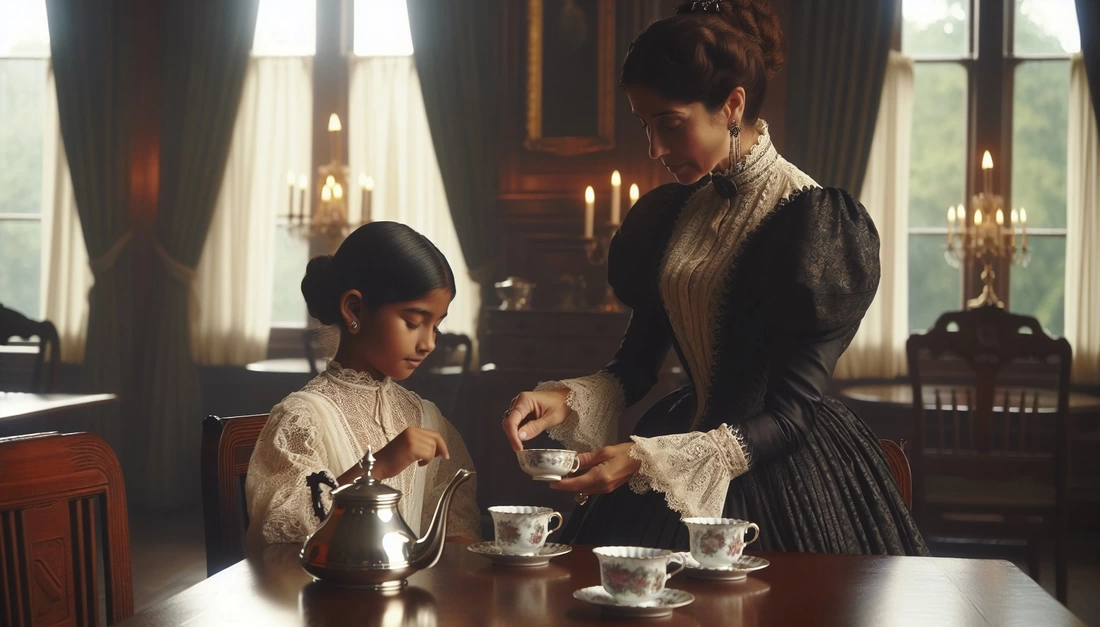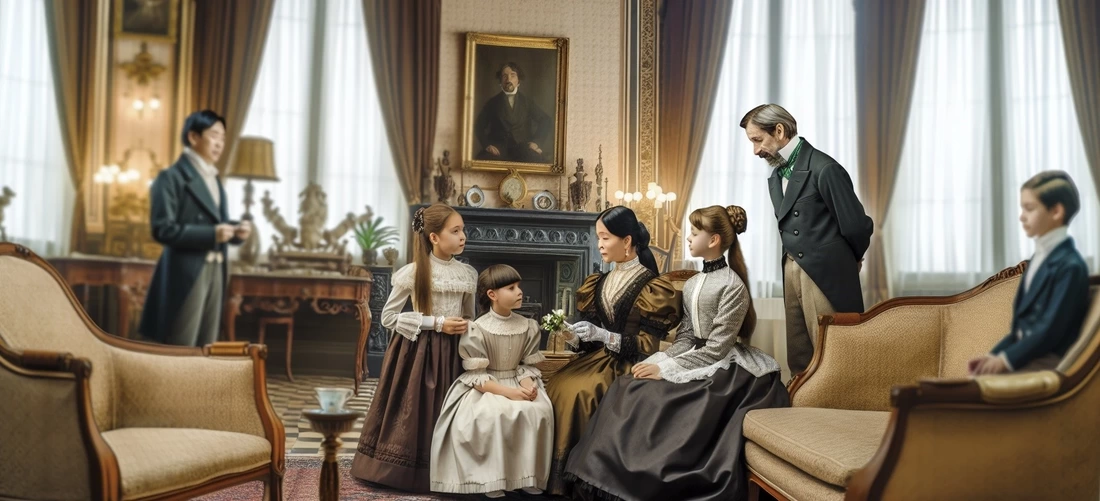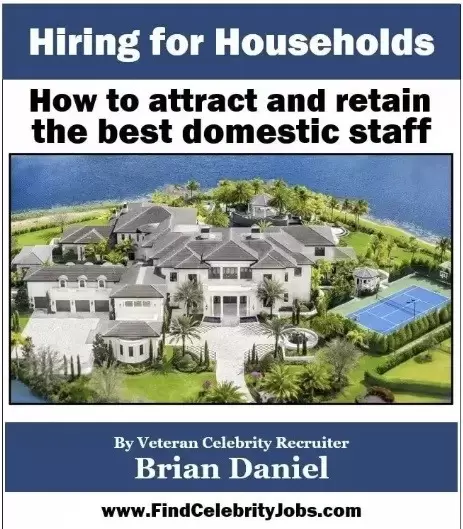Discovering the Unique Benefits of Hiring a Governess for Your Children
Why choose a governess for teaching and nurturing your children at home? Governesses offer a unique blend of education, etiquette, and emotional guidance to enrich your children’s daily lives. In this article, we’ll examine the governess’s role from past to present, her impact on children’s development, and how to find the right one for your household. This is brought to you by the household staffing recruiters at The Celebrity Personal Assistant Network.
Key Takeaways
- A governess specializes in a child’s academic curriculum within the home and often requires an educational background in Early Childhood Education or related fields, embodying the roles of both nanny and tutor.
- Historically, governesses were central to European upper-class households, imparting academic knowledge, social skills, and etiquette as a status symbol.
- In modern times, governesses play a vital role in child development by providing educational support, personalized tutoring, and mentoring while helping children develop essential life skills.
Understanding the Governess
A governess is a woman employed to oversee and educate children within the comforts of their home, focusing on their educational development. Unlike other educators, a governess specializes in the academic curriculum, offering a comprehensive approach to a child’s education. In this field, governesses play a crucial role in shaping young minds.
Embarking on a career as a governess typically requires a robust academic background, often a bachelor’s degree in early childhood education or a related field. A Certified Professional Governess (CPG) holds a baccalaureate degree, emphasizing the high academic standards of the profession.
A governess transcends the role of just an academic instructor; she embodies both a nanny and a tutor, holistically focusing on a child’s life, encompassing manners, etiquette, and social interactions. A governess works closely with the family, ensuring the best possible care and education for the children.
Far from being confined to the classroom, a governess organizes educational outings, enhancing children’s education through these experiences and preparing daily interactive lessons to teach children.
Most governesses live with the family, ensuring a consistent and stable learning environment for the children.
Embarking on a career as a governess typically requires a robust academic background, often a bachelor’s degree in early childhood education or a related field. A Certified Professional Governess (CPG) holds a baccalaureate degree, emphasizing the high academic standards of the profession.
A governess transcends the role of just an academic instructor; she embodies both a nanny and a tutor, holistically focusing on a child’s life, encompassing manners, etiquette, and social interactions. A governess works closely with the family, ensuring the best possible care and education for the children.
Far from being confined to the classroom, a governess organizes educational outings, enhancing children’s education through these experiences and preparing daily interactive lessons to teach children.
Most governesses live with the family, ensuring a consistent and stable learning environment for the children.
The Historical Significance of a Governess
Historically, governesses were a prominent feature in European households, with England being a notable example. The upper class employed governesses to educate their children on various subjects, including:
During the 18th and 19th centuries, the role of the governess was quite comprehensive. Apart from teaching academic subjects, governesses were responsible for imparting social skills and etiquette essential for young ladies in high society. Their role was pivotal in equipping young girls for their eventual roles as wives and mothers.
The 19th century saw a surge in the employment of governesses among wealthy families. Sometimes, a governess would be responsible for multiple children within a household, reflecting the high demand for their services.
Governesses were perceived as a status symbol in aristocratic circles. Their upper-class employment signified the family's affluence and erudition. The governesses lived with the family, adding a touch of sophistication and cultural refinement to the household.
- reading
- writing
- arithmetic
- French conversation
- history
- geography
During the 18th and 19th centuries, the role of the governess was quite comprehensive. Apart from teaching academic subjects, governesses were responsible for imparting social skills and etiquette essential for young ladies in high society. Their role was pivotal in equipping young girls for their eventual roles as wives and mothers.
The 19th century saw a surge in the employment of governesses among wealthy families. Sometimes, a governess would be responsible for multiple children within a household, reflecting the high demand for their services.
Governesses were perceived as a status symbol in aristocratic circles. Their upper-class employment signified the family's affluence and erudition. The governesses lived with the family, adding a touch of sophistication and cultural refinement to the household.
Modern-Day Governess: A Contemporary Overview
Fast forward to the 21st century, and the role of the governess has evolved significantly. Today, governesses are not just educators but also mentors and guidance figures. They hold solid educational qualifications, often with prior experience in primary or international English teaching and offer academic and emotional assistance within a private household.
In the modern era, a governess holds a fundamental position in child development. They provide:
The duties and obligations of a contemporary governess include nurturing children, supervising schoolwork, providing personalized tutoring, and working with other domestic staff members in the household.
With the fast-paced rhythm of modern life, governesses have emerged as an irreplaceable resource for today’s celebrities, high-net-worth families, and billionaires. A governess should combine education with emotional and social development, providing a holistic approach to childcare.
In the modern era, a governess holds a fundamental position in child development. They provide:
- Educational support
- Help children develop essential life skills, such as communication and problem-solving
- Prepare them for academic success through personalized tutoring and exam preparation
The duties and obligations of a contemporary governess include nurturing children, supervising schoolwork, providing personalized tutoring, and working with other domestic staff members in the household.
With the fast-paced rhythm of modern life, governesses have emerged as an irreplaceable resource for today’s celebrities, high-net-worth families, and billionaires. A governess should combine education with emotional and social development, providing a holistic approach to childcare.
The Day-to-Day Life of a Governess
The daily routine of a governess includes:
These tasks enhance a child's educational development and overall growth throughout their entire life.
Teaching manners and etiquette also forms a significant part of a governess’s duties. She refines children’s social skills, ensuring their readiness for diverse social environments. The governess is a living teaching model, residing with the high-net-worth family and being involved in the child’s daily life.
The daily schedule of a governess typically involves initiating morning musical practice, overseeing breakfast, and assisting with preparations for school or daily activities.
This routine is flexible and adapts to the children’s requirements, including dressing children and adding a layer of enrichment to the child’s entire life.
- Preparing daily lessons
- Organizing a timetable for coursework
- Providing academic support
- Assisting children in a secure environment
- Supervising daily homework
- Encouraging extracurricular learning and activities
These tasks enhance a child's educational development and overall growth throughout their entire life.
Teaching manners and etiquette also forms a significant part of a governess’s duties. She refines children’s social skills, ensuring their readiness for diverse social environments. The governess is a living teaching model, residing with the high-net-worth family and being involved in the child’s daily life.
The daily schedule of a governess typically involves initiating morning musical practice, overseeing breakfast, and assisting with preparations for school or daily activities.
This routine is flexible and adapts to the children’s requirements, including dressing children and adding a layer of enrichment to the child’s entire life.
How to Conduct a Successful Governess Search
In searching for a governess, it’s imperative to identify specific qualities in a prospective candidate because the governess plays an essential role in the household. These qualities and skills include:
Verifying the references of a potential governess is a crucial step. Ask questions about the individual’s employment duration, specific job duties and responsibilities, and the child's age under their care. Remember, a governess will be responsible for your children, so thorough verification is essential.
Formalizing a contract with a governess should encompass details like wages, benefits, schedule, and house rules. Since no details should be left to chance, having a visitor policy and set of emergency procedures would also be beneficial.
- Reliability
- Flexibility
- Strong communication skills
- Experience in working with children
- Trustworthiness
- Genuine enjoyment of working with children
- Patience
- Organizational skills
Verifying the references of a potential governess is a crucial step. Ask questions about the individual’s employment duration, specific job duties and responsibilities, and the child's age under their care. Remember, a governess will be responsible for your children, so thorough verification is essential.
Formalizing a contract with a governess should encompass details like wages, benefits, schedule, and house rules. Since no details should be left to chance, having a visitor policy and set of emergency procedures would also be beneficial.
More about a governess
What is a governess vs nanny?
A governess focuses on teaching and educating children, while a nanny ensures children are active and engaged in play. The key difference lies in their roles and responsibilities. If a nanny is only part-time, she may supervise other women's children, while a governess is always a full-time job.
A governess organizes educational outings
Since a governess is responsible for children's education, she may be involved in educational activities outdoors. For example, a lesson to teach reading about animals may take place at a zoo. This type of lesson also helps with language development.
A governess prepares daily lessons
Even at the best private schools, teachers face challenges educating dozens of children. Hiring a nanny is especially helpful in specialized subjects, so having educational credentials is essential for a governess.
Do upper-class employed governesses make more money?
Yes, they do. A governess who works for celebrities, high-net-worth families, or billionaires may command an excellent salary exceeding $250,000 a year. Typical duties for aristocratic families would include daily lessons and etiquette classes.
What qualities should I look for when hiring a governess?
When hiring a governess, look for qualities such as reliability, flexibility, strong communication skills, experience working with children, trustworthiness, and genuine enjoyment of the job. These qualities are essential for ensuring the well-being and development of your children.
A governess should be involved in ongoing education and professional development. A domestic staffing agency can assist with the verification of higher education.
A governess should be involved in ongoing education and professional development. A domestic staffing agency can assist with the verification of higher education.
A final word on a governess role
In conclusion, hiring a governess offers a unique blend of personalized education, etiquette training, and emotional support for your children. If you’re seeking an all-rounded development for your children in the comfort and security of their home, a governess could be the perfect addition to your family.
Keep in mind that a secondary responsibility in the role would be to prepare meals if the nanny is unavailable. A governess ensures that the children are always accommodated, even though the main focus of the role is education.
Keep in mind that a secondary responsibility in the role would be to prepare meals if the nanny is unavailable. A governess ensures that the children are always accommodated, even though the main focus of the role is education.





